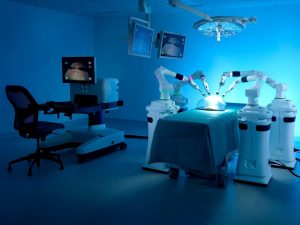A rising interest in medical technology within the last year has made way for increased acquisitions and investments into surgical robotics companies. Companies like Edge Medical Robotics and Memic have seen a groundbreaking increase in capital investments in 2021, with both companies nearing $1 billion in investment capital, while others like Stryker and Ascendum Capital have been focused on acquisition of robotics companies to widen their playing fields.
Amongst the companies making big gains in the current climate is CMR Surgical, formerly known as Cambridge Medical Robotics, a UK-based business specializing in robot-assisted surgical systems. The company has recently raised $600 million in Series D funding. CMR intends on using these funds to further their main-focus surgical technology, Versius.
Versius is a robotic system which assists doctors in performing keyhole surgeries, with specific focus on bowel disease and bowel cancer related surgeries. This minimally invasive system is responsible for around 1,000 successful surgeries worldwide so far and, with the help of this new capital, will spread to more hospitals worldwide.
Along with expedited Versius production, additional funding will be divvied out to increase the quality of Versius Connect, the digital operating system which serves as a link between doctor and robot in the operating room.
This newly acquired capital investment has brought CMR up to a $3 billion valuation, giving it major leeway in terms of implementing it’s robotics machinery into more hospitals worldwide.
“CMR Surgical is transforming surgical robotics to convert under-penetrated open & laparoscopic procedures in new international markets where robotic surgeries are less prevalent such as India, the Middle East and Latin America. We look forward to working with CMR in its mission to make robotic keyhole surgery available to everyone.” said Yanni Pipilis, Managing Partner of SoftBank Investment Advisers. With the demand for surgical-assistance robotics on the rise, bringing this technology to countries with less medical outreach is critical to development of health systems around the world.
This series of funding saw investments from RPMI Railpen, Tencent and Chimera, as well as additional capital from existing investors such as Lightrock, Cambridge Innovation Capital, and GE Healthcare, among others.























